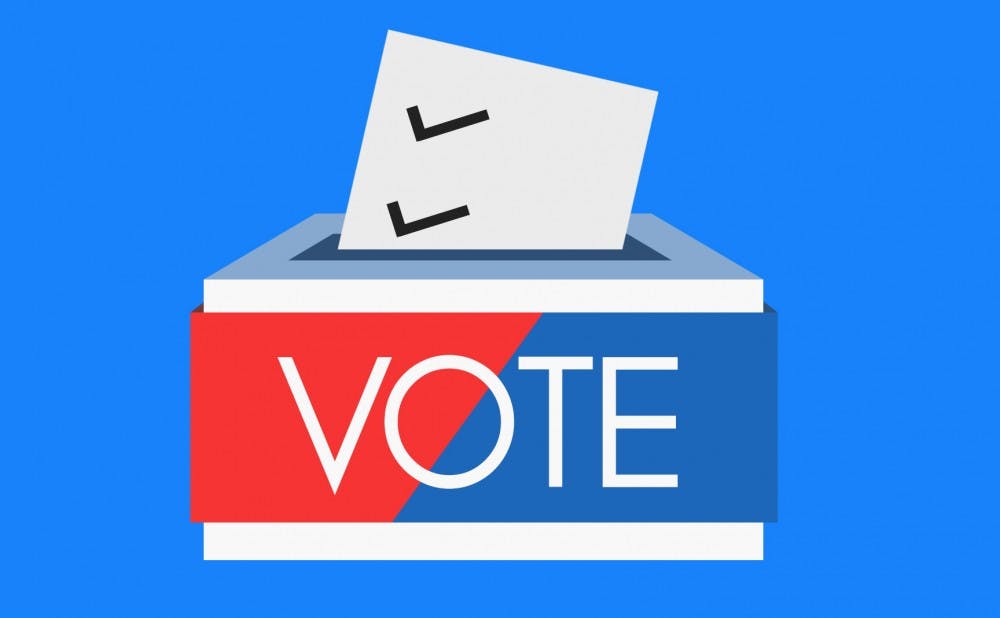In the 2014 midterm elections, just 17 percent of 18 to 24 year olds cast a ballot, according to the Campus Vote Project—a trend from which Duke students are not immune.
In precinct 5, which includes Duke’s Central and West campuses, voter turnout has averaged less than one percent for municipal elections.
At stake in North Carolina’s midterm elections Nov. 6 are six proposed constitutional amendments, which could create a voter ID requirement for in-person voting and cap the state's personal and corporate income tax rates. There’s also a North Carolina Supreme Court justice race and 13 U.S. House of Representatives seats up for grabs across the state.
Alex Rosenberg, R. Taylor Cole professor of philosophy, promoted voter registration in an unconventional way: giving each of his 90 students a voter registration form and information about eligibility and what’s on the ballot. Rosenberg also offered to mail in students’ completed forms at his own expense if they don’t want to pay for postage.
“Voting is not only your duty and easy but allows you to express yourself,” Rosenberg said.
He explained that he decided to distribute the voter registration form to his classes because it’s not available online. But he said Duke students have no excuse not to vote.
“University students are so much more well-educated, so much more affluent, and have so much more time on their hands, and all have cars,” he said. “What’s the explanation?”
Outside of Rosenberg's class, student leaders have coordinated since the spring with Duke's Center for Political Leadership, Innovation and Service (POLIS) to push voting initiatives on campus. The group, called Duke Votes, had its first meeting in September.
Historically, voting initiatives on campus have been led by multicultural groups, with each organization hosting their own voter registration drives and educational events.
“There are tangible consequences to voting and not voting for our communities,” said junior Corey Pilson, president of Black Men’s Union and chief of staff of Black Student Alliance. “In the civil rights movement, in the women’s movement, you see large voter registration efforts because your voice is in your ballot.”
Despite making strong individual campaigns, student leaders had often failed to communicate with each other. And with each presidential cycle and accompanying flurry of voting initiatives, previous student leaders graduated and younger ones took up the mantle of registering, education and mobilizing Duke’s campus.
“A lot of the time, it’s like starting from scratch," said Michelle Li, the president of Asian Students Association. "So instead, with POLIS’s involvement … we’re trying to create some kind of infrastructure so that we’re not starting from scratch and duplicating work every single cycle."
Volunteers who tabled recently on the Bryan Center plaza and in front of Marketplace registered more than 500 people, Li said.
According to Brian Buhr, president of Duke University Union, POLIS seemed like an obvious partner because voting organizations are housed in political institutes at other universities across the country.
“[POLIS has] lined up everyone in the administration -- from President Price to VP Moneta to various deans and vice provosts -- to get on board with this issue and understand why it matters,” Buhr said.
POLIS also coordinated with the Durham Board of Elections and Michael Schoenfeld, vice president for public affairs and government relations to move the early voting site to West Union.
“That’s a major breakthrough,” Buhr said.
Past on-campus voting sites, including the Freeman Center and Devil’s Den, were less accessible to students and often blamed for low voter turnout. Duke Votes also hopes to promote voting among Duke employees.
“This is a large population at Duke that’s demographically very different than the students, but their voice matters just as much if not more given that they’re actually from Durham or live in Durham and are impacted long-term by the decisions that are made,” Li said.
Duke Votes is also planning a Party at the Polls event to drive traffic to the Brodhead Center during early voting, which lasts from Oct. 17 until Nov. 3.
Get The Chronicle straight to your inbox
Sign up for our weekly newsletter. Cancel at any time.
“Whether you’re conservative or liberal, you need to get out and vote because we’re too smart and there’s too many of us not to vote,” said Pilson.

